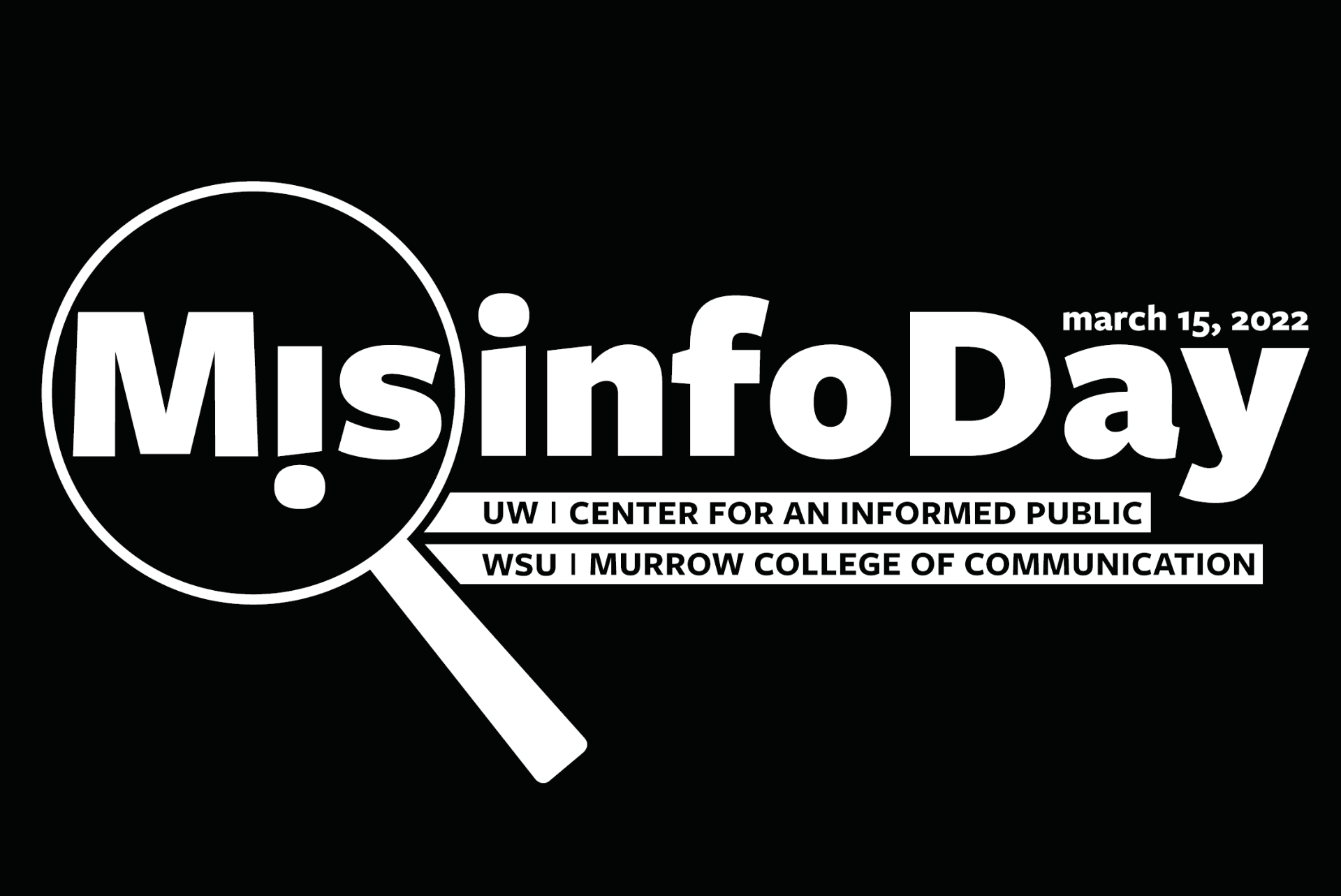The University of Washington’s Center for an Informed Public and Washington State University’s Edward R. Murrow College of Communication, which are co-presenting MisinfoDay 2022 on March 15, are finalizing details for this year’s virtual workshops, resources and other classroom activities designed for middle and high school students, teachers, librarians and other educators.
Registration closes on March 4. (Workshop videos will be available on Tuesday, March 15 on the CIP’s MisinfoDay page.) Thus far, more than 100 classes and other educators from across Washington state and beyond have registered. That represents nearly 80 Washington state educators, 62 schools in Washington state, and more than 30 others from universities, public libraries, and other educational organizations across the United States.
This year’s MisinfoDay program will feature eight virtual, pre-recorded workshops (see details below) facilitated by experts from the CIP, UW-Bothell and WSU’s Murrow College of Communication, with complimentary classroom activities, plus a special “escape room” game available as a teaching resource.
The game, the Euphorigen Investigation, has been a project co-developed by the CIP, the Technology & Social Change Group at the UW Information School and other partners. Game development was jumpstarted by the CIP’s Innovation Fund and expanded through funding from the Institute for Museum and Library Services is being tested in 10 public libraries.
MisinfoDay, which was launched by the UW Information School in 2019, is now part of the CIP’s statewide collaboration with Washington State University. In 2021, more than 1,000 students participated in MisinfoDay’s virtual workshops. See highlights and key lessons from MisinfoDay 2021.
This year’s MisinfoDay planning saw assistance from a new Student Advisory Board, a group of students from nine high schools in Washington state. The students had input on workshop recording content, brainstormed examples of misinformation to use in activities, and tested activities.
“It’s been great working with high school students to shape this year’s MisinfoDay program. Their feedback has been instrumental in helping us understand how they see misinformation affecting their lives and how we can help them be better prepared to deal with it,” said Liz Crouse, MisinfoDay coordinator at the Center for an Informed Public.
***
Workshop Details
How to Talk With Friends or Family Who Believe Misinformation
How can we help friends and family who have fallen for harmful misinformation? CIP co-founders Kate Starbird and Jevin West and CIP postdoctoral scholar Maddy Jalbert will share advice based on research and their own personal experiences on how to navigate these difficult conversations. Hanson Hosein, co-founder of the UW Communication Leadership program, will moderate.
Why We Fall for Misinformation
We’re all vulnerable to misinformation. Why can it be so tricky to sort fact from fiction? Why is it sometimes difficult to believe verified facts? CIP co-founder Kate Starbird and CIP postdoctoral scholar Maddy Jalbert will help you answer those questions.
How to Tell If What You Saw Online Is True
What should we do if we see something online that we’re not sure is true? What about if we see a source we’ve never heard of? CIP research scientist Mike Caulfield will walk through a few examples of how to use his SIFT method to quickly decide if something is credible enough to share.
Numbers can be very persuasive – but, just like other information, they can be used in misleading ways. How do we know if we can believe the statistics and data graphics we see in headlines and social media posts? CIP co-founder Jevin West and CIP faculty member Carl Bergstrom, creators of the popular UW course Calling Bull, will walk through a few examples of how to recognize misleading uses of data.
How Journalists Find the Truth
How do journalists track down all the details of a story and ensure they’re reporting the truth? What rules do they follow to minimize mistakes and make sure you have all the info you need to make good decisions? Northwest Public Broadcasting journalist Johanna Bejarano will walk through the behind-the-scenes steps of reporting a recent story.
Jennifer Henrichsen, an assistant professor at the Edward R. Murrow College of Communication at WSU, shares insights about how college students should prepare for a career in journalism, understand how journalism is under attack and why journalism is important for democracy.
How to Combat Health Misinformation
- Misinformation During a Global Pandemic: Lessons Learned | Justin Gill, health policy lecturer at UW Bothell’s School of Nursing & Health Studies and urgent care nurse practitioner in Everett, Washington, will discuss why the coronavirus pandemic led to an “infodemic” and share quick tips on cutting out misinformation.
- Making Smart Decisions About Health Information | Erica Weintraub Austin, Director of the Edward R. Murrow Center for Media and Health Promotion Research at WSU, will discuss how our decisions around health are guided by both logic and emotions such as fear, anger and wishful thinking and share how media literacy can help us make our emotions work for us instead of against us, to help protect us from mis- and disinformation.
Questions? Contact Liz Crouse, MisinfoDay Coordinator, at lizcrous@uw.edu
READ MORE ABOUT MISINFODAY




